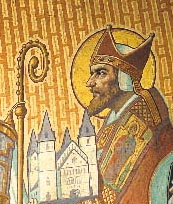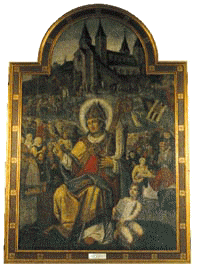
St. Willibrord
Born: 658
Died: November 7, 739
Canonized: pre-Congregation
Feast Day: November 7
Patron Saint of: epilepsy, Netherlands
Willibrord made his early studies at the Abbey of Ripon near York, as a disciple of St. Wilfrid, and then entered the Benedictine Order. When twenty years old he went to Ireland and spent twelve years in the Abbey of Rathmelsigi (identified by some as Mellifont in Co. Louth) under St. Egbert. From him Willibrord and eleven companions received the mission to Frisia, at the request of Pepin. They came to Utrecht but did not remain there, repairing to the court of Pepin. In 692 Willibrord went to Rome, received Apostolic authorization, and returned to his missionary labors. At the wish of Pepin he went for a second time to Rome, was consecrated Bishop of the Frisians by Sergius III (21 Nov., 695) in the Church of St. Cecilia, and given the name of Clement. He also received the pallium from the pope. On his return he labored among the people assigned to him; to raise recruits for future apostolic work he founded a monastery at Utrecht, where also he built a church in honor of the Holy Redeemer and made it his cathedral. In 698 he established an abbey at the Villa Echternach on the Sure; this villa had been presented to him by St. Irmina, daughter of St. Dagobert II, the donation being legally confirmed in 706.
When Radbod gained possession of all Frisia (716) Willibrord was obliged to leave, and Radbod destroyed most of the churches, replaced them by temples and shrines to the idols, and killed many of the missionaries. Willibrord and his companions made trips between the Maas and the Waal, to the North of Brabant, in Thuringia and Geldria, but met with no success in Denmark and Helgoland. After the death of Radbod he returned (719) and repaired the damages done there, being ably assisted in this work by St. Boniface. Numberless conversions were the result of their labor. Willibrord frequently retired to the Abbey of Echternach to provide more particularly for his own soul; he was buried in the oratory of this abbey, and after death was almost immediately honored as a saint.
[ Source: The Catholic Encyclopedia ]







